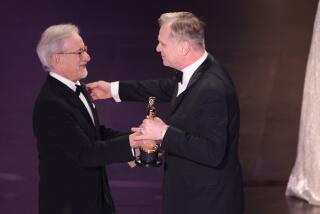Oscar voting is underway. Here is film critic Justin Chang’s dream ballot
I don’t envy the members of the Academy of Motion Picture Arts and Sciences their decisions this year, and not simply because of their tighter deadlines. Typically held at the end of February or beginning of March, the Oscars ceremony will take place on the relatively early date of Feb. 9, which means that voters have only until Jan. 7 to submit their nominations ballots. (Nominations will be announced Jan. 13.)
But the task before them would be difficult even if they had all the time in the world. Even more than in previous years, I am astounded at the sheer number of terrific movies I saw in 2019, the persistence and ingenuity of so many great filmmakers in the face of an industry that has rarely seemed more indifferent to their survival. I am also troubled by how little my imaginary ballot reflects the breadth and range of the year’s achievements: Were I to flout the academy’s rules and allow myself a generous 20 slots per category, I could fill them all and still have names and titles to spare.
Alas, some rules must be followed. Not all of them — I refuse to adhere to the academy’s overly restrictive short lists, or even its long lists, in categories like international feature (formerly foreign-language film) or documentary feature. But otherwise, if I had a ballot for this year’s derby — and like all critics, I do not — here are the nominees I’d like to see up for picture, director, the acting and writing categories and a few more races in which I’ve taken an interest.
Best picture
“Ash Is Purest White”
“An Elephant Sitting Still”
“High Life”
“The Irishman”
“Knives Out”
“Little Women”
“Marriage Story”
“Once Upon a Time … in Hollywood”
“Parasite”
“The Souvenir”
The academy hasn’t nominated 10 movies for best picture in a while, but it’s technically still possible — and in a year this rich, I’d hope for nothing less. Here are the 10 I would put in, with regrets to “A Hidden Life,” “Give Me Liberty,” “Portrait of a Lady on Fire,” “Synonyms” and many others that easily could have subbed in. Though it’s heartening that “Parasite” (like “Roma,” which was nominated but didn’t win last year) is being hailed as potentially the first non-English-language picture to win the big prize, that milestone might already be well behind us if the academy looked beyond national borders regularly, rather than once in a blue moon.
Best director
Bong Joon Ho, “Parasite”
Greta Gerwig, “Little Women”
Joanna Hogg, “The Souvenir”
Hu Bo, “An Elephant Sitting Still”
Martin Scorsese, “The Irishman”
Probably the least known name on my list is Hu, a prodigiously talented Chinese filmmaker who died in 2017 at the age of 29, mere months before festival audiences got to see “An Elephant Sitting Still,” his brilliant first and final feature. At just a few minutes shy of four hours, it’s longer than “The Irishman” and just as enveloping. No less than the other sterling directorial achievements represented here, it deserves to be remembered.
Best actress
Elisabeth Moss, “Her Smell”
Lupita Nyong’o, “Us”
Mary Kay Place, “Diane”
Alfre Woodard, “Clemency”
Zhao Tao, “Ash Is Purest White”
In what looks increasingly like a toss-up between two past winners (“Bombshell’s” Charlize Theron and “Judy’s” Renée Zellweger), it’s heartening to think that a third Oscar laureate, Nyong’o, might also be in the running. Her strong performance with critics groups so far gives me hope that she’ll overcome the industry’s anti-genre bias for her stunning, dual-layered performance in one of the year’s strongest studio movies.
My other favorites in this race all face longer odds, mainly due to underexposure and/or unfortunate timing. Although “Clemency” was one of the first movies I saw in 2019, when it won the top U.S. drama prize at the Sundance Film Festival, it’s also one of the last ones to be released this year. Had the movie hit theaters earlier, I suspect that Woodard’s quietly galvanizing work would be getting more recognition — though it’s not too late.
Best actor
Antonio Banderas, “Pain and Glory”
Adam Driver, “Marriage Story”
Tom Mercier, “Synonyms”
Brad Pitt, “Once Upon a Time … in Hollywood”
Adam Sandler, “Uncut Gems”
In a year heavy with male angst, it’s no surprise that lead actor is being regarded as the single most competitive category: In a lesser field, other favorites like Robert De Niro (“The Irishman”), Joaquin Phoenix (“Joker”), Eddie Murphy (“Dolemite Is My Name”), Paul Walter Hauser (“Richard Jewell”) and Matthew McConaughey (“The Beach Bum”) might have easily made the cut.
Pitt, who also did outstanding leading work in “Ad Astra,” is being pushed for supporting actor in “Once Upon a Time … in Hollywood,” mainly to avoid competition with his top-billed costar, Leonardo DiCaprio. But studio campaign strategies have done nothing to shake my feeling, after three viewings of “Hollywood,” that the movie belongs to him.
Best supporting actress
Cho Yeo Jeong, “Parasite”
Jennifer Lopez, “Hustlers”
Florence Pugh, “Little Women”
Lauren “Lolo” Spencer, “Give Me Liberty”
Zhao Shuzhen, “The Farewell”
I was tempted to allocate four slots to “Parasite” (the other actresses are Park So Dam, Lee Jeong Eun and Chang Hyae Jin), but I’ll let Cho’s subtly multifaceted performance as a lofty, guileless housewife stand in for them all. Notably, my other four favorites — Lopez, Pugh, Spencer and Zhao — all did terrific work as part of a large ensemble, blending in beautifully but also leaving unmistakable standout impressions.
Best supporting actor
Bill Camp, “Dark Waters”
Tom Hanks, “A Beautiful Day in the Neighborhood”
Aldis Hodge, “Clemency”
Al Pacino, “The Irishman”
Song Kang Ho, “Parasite”
Plausible arguments have been made that some of the actors listed here — particularly Pacino and Hanks — are leads or at least coleads in their respective films. (Some might say the same for “The Lighthouse’s” Willem Dafoe, who missed my top five by a bedraggled whisker.) All the more reason I hope voters check out the sterling character work done by Hodge, Song and especially Camp, whose ferocious turn as an aggrieved farmer in the underappreciated “Dark Waters” is precisely the kind of uncompromised, unforgettable performance this category used to be made for.
Best original screenplay
Radu Jude, “I Do Not Care If We Go Down in History as Barbarians”
Rian Johnson, “Knives Out”
Noah Baumbach, “Marriage Story”
Bong Joon Ho and Han Jin Won, “Parasite”
Nadav Lapid and Haim Lapid, “Synonyms”
It’s a shame that not nearly enough academy members — even those inclined to recognize screenplays not written in English — will make time to see “I Do Not Care If We Go Down in History as Barbarians” and “Synonyms.” The furious verbal pyrotechnics in both movies are awfully impressive, but they’re matched by a rich understanding of cinema as a visual language.
Best adapted screenplay
Micah Fitzerman-Blue and Noah Harpster, “A Beautiful Day in the Neighborhood”
Mario Correa and Matthew Michael Carnahan, “Dark Waters”
Steven Zaillian, “The Irishman”
Greta Gerwig, “Little Women”
Christian Petzold, “Transit”
It’s been a while since I’ve seen a literary adaptation as structurally inventive and playfully meta as Gerwig’s “Little Women” — or, for that matter, a movie that so boldly answered the question of why we needed another version of this oft-adapted story. No less than “A Beautiful Day in the Neighborhood,” “The Irishman” and “Transit,” it’s a reminder that, sometimes, the more freely and liberally a writer reimagines their source material, the better.
Best cinematography
Jörg Widmer, “A Hidden Life”
Jarin Blaschke, “The Lighthouse”
Yao Hung-i, Dong Jingsong and David Chizallet, “Long Day’s Journey Into Night”
Claire Mathon, “Portrait of a Lady on Fire”
Drew Daniels, “Waves”
Yes, Roger Deakins is a genius and “1917” is a technical marvel. But if you’re wowed by unbroken long takes — particularly those that were achieved in camera sans digital finessing — well, check out the astonishment that is “Long Day’s Journey Into Night” and tell me I’m wrong.
Best film editing
Kirill Mikhanovsky, “Give Me Liberty”
Thelma Schoonmaker, “The Irishman”
Nick Houy, “Little Women”
Yang Jin Mo, “Parasite”
Ronald Bronstein, “Uncut Gems”
Most of these favorites refute the conventional wisdom that the best editing is always invisible editing. Perhaps no movie did this more than “Give Me Liberty,” which underwent some recutting between its initial Sundance screenings and its eventual release months later. In either version, its raw, ragged evocation of a day in the life of some extraordinarily compelling travelers sweeps you up with an almost visceral force.
Best production design
François-Renaud Labarthe, “High Life”
Louise Ford, “The Lighthouse”
Henrik Svensson, “Midsommar”
Lee Ha Jun, “Parasite”
Suzie Davies, “Peterloo”
Between “High Life” and “The Lighthouse,” it was a great year to be trapped in grotty quarters with some very bad psychosexual vibes and Robert Pattinson. By contrast, there were the wide open spaces of “Midsommar,” the luxurious rooms of “Parasite” and the 19th century Manchester locations of “Peterloo,” each movie pulling us into a fully imagined landscape where horror can strike in broad daylight.
Best international feature
“Ash Is Purest White”
“An Elephant Sitting Still”
“Parasite”
“Portrait of a Lady on Fire”
“Synonyms”
Only one of these titles, “Parasite,” was even submitted to the academy for consideration. If it winds up among the final five, as it almost certainly will, it will be the first South Korean title ever to do so. That historic oversight tells you something about the academy’s skewed priorities in this category, which has overwhelmingly favored European film and continues to do so even this year. That said, if “Parasite” prevails, it will do so opposite some very worthy competition (including “Atlantics,” “Beanpole,” “Honeyland,” “Les Misérables” and “Pain and Glory,” all of which also made the short list).
Best documentary feature
“American Factory”
“Apollo 11”
“Black Mother”
“Honeyland”
“What You Gonna Do When the World’s on Fire?”
“Apollo 11’s” deeply stirring tribute to old-school American enterprise feels like the lone ray of optimism in a group of documentaries that, along with some of my other favorites (“Aquarela,” “The Edge of Democracy,” “One Child Nation”), show us corners of a world in social, economic and environmental freefall.
Best animated feature
“I Lost My Body”
“Marona’s Fantastic Tale”
“Weathering With You”
There are usually five nominees, but in a weak year overall for American studio animation, three seem like plenty — especially when they’re as good as these three. Jérémy Clapin’s French-language “I Lost My Body” is now streaming on Netflix; “Marona’s Fantastic Tale,” from Romania’s Anca Damian, and “Weathering With You,” from Japan’s Makoto Shinkai, will open in U.S. theaters this year.
More to Read
Only good movies
Get the Indie Focus newsletter, Mark Olsen's weekly guide to the world of cinema.
You may occasionally receive promotional content from the Los Angeles Times.











